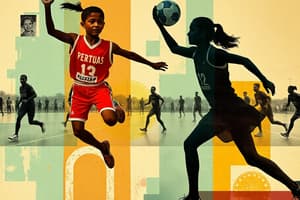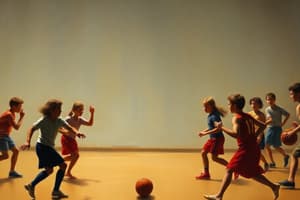Podcast
Questions and Answers
What is the primary purpose of physical education in the context of personal development?
What is the primary purpose of physical education in the context of personal development?
- To emphasize academic achievement over physical fitness.
- To improve only athletic performance.
- To facilitate the acquisition of skills and knowledge through physical activity. (correct)
- To promote competition among students.
Which aspect of physical education does NOT contribute to emotional development?
Which aspect of physical education does NOT contribute to emotional development?
- Courage.
- Self-expression.
- Self-confidence.
- Competitive skills. (correct)
What is a key factor in achieving physical fitness according to the information provided?
What is a key factor in achieving physical fitness according to the information provided?
- Doing minimal exercises to save energy.
- Following a proper nutrition and exercise plan. (correct)
- Participating in sports exclusively.
- Developing skills without physical activity.
Which of the following is considered a component of health-related fitness?
Which of the following is considered a component of health-related fitness?
In what way does physical education contribute socially to students?
In what way does physical education contribute socially to students?
The practice of Physical Education and Sports is considered a fundamental right for all.
The practice of Physical Education and Sports is considered a fundamental right for all.
Article XIV of the 1986 Constitution of the Philippines does not mention the promotion of Physical Education.
Article XIV of the 1986 Constitution of the Philippines does not mention the promotion of Physical Education.
The right to Physical Education should be treated as less important than the right to medical care.
The right to Physical Education should be treated as less important than the right to medical care.
All educational institutions in the Philippines are required to undertake regular sports activities.
All educational institutions in the Philippines are required to undertake regular sports activities.
The International Charter of Physical Education and Sports was adopted in 1985.
The International Charter of Physical Education and Sports was adopted in 1985.
Flashcards
Physical Education (PE)
Physical Education (PE)
An educational process using physical activity to develop skills, fitness, knowledge, and positive attitudes, promoting holistic well-being.
Physical Development (PE)
Physical Development (PE)
Improved health and fitness achieved through engaging in P.E.
Mental Development (PE)
Mental Development (PE)
PE gives understanding of body functions and processes.
Emotional Development (PE)
Emotional Development (PE)
Signup and view all the flashcards
Social Development (PE)
Social Development (PE)
Signup and view all the flashcards
Physical Fitness
Physical Fitness
Signup and view all the flashcards
Health-related fitness
Health-related fitness
Signup and view all the flashcards
Skill-related fitness
Skill-related fitness
Signup and view all the flashcards
Fundamental Right to Physical Education
Fundamental Right to Physical Education
Signup and view all the flashcards
Philippine Constitution on PE
Philippine Constitution on PE
Signup and view all the flashcards
Nutrition (PE)
Nutrition (PE)
Signup and view all the flashcards
Exercise (PE)
Exercise (PE)
Signup and view all the flashcards
Rest (PE)
Rest (PE)
Signup and view all the flashcards
Recovery Plan (PE)
Recovery Plan (PE)
Signup and view all the flashcards
League Competitions
League Competitions
Signup and view all the flashcards
Amateur Sports
Amateur Sports
Signup and view all the flashcards
Holistic Development
Holistic Development
Signup and view all the flashcards
International Charter PE
International Charter PE
Signup and view all the flashcards
Sportsmanship
Sportsmanship
Signup and view all the flashcards
Study Notes
Definition of Physical Education
- Physical education (P.E.) is an educational process utilizing physical activity to foster skills, fitness, knowledge, and positive attitudes.
- Aims to facilitate optimal development and well-being of individuals.
- Contributes to holistic development, addressing physical, mental, emotional, and social aspects.
Physical Development
- Engaging in P.E. leads to improved health and enhanced physical fitness.
- Students learn the importance of physical activity and its benefits.
Mental Development
- Provides educational insights into body functions and physical processes.
- Helps students understand how their bodies work and the reasons behind various bodily functions.
Emotional Development
- Encourages self-expression and emotional growth through physical activity.
- Promotes essential qualities such as courage, determination, self-confidence, and self-control.
Social Development
- Offers opportunities to cultivate important social skills relevant to daily life.
- Encourages traits like friendliness, respect, honesty, and sportsmanship through interaction and teamwork.
Physical Fitness
- Defined as a state of health and well-being, emphasizing the ability to perform sports, occupational tasks, and daily activities effectively.
- Achieved through:
- Proper nutrition
- Moderate to vigorous physical exercise
- Adequate rest
- A structured recovery plan
Components of Physical Fitness
- Divided into two main categories:
- Health-related fitness components (focus on overall health benefits)
- Skill-related fitness components (emphasizing proficiency in physical activities)
Fundamental Right to Physical Education and Sports
- The International Charter of Physical Education and Sports emphasizes that participation in Physical Education and Sports is a fundamental right for everyone.
- This right is equated to other essential rights such as access to adequate food, shelter, and medical care, highlighting its importance in overall well-being.
Philippine Constitution on Physical Education
- Article XIV, Section 19 of the 1986 Philippine Constitution mandates that the state promote Physical Education and encourage sports programs.
- The constitution advocates for league competitions and amateur sports, aiming to develop citizens who are self-disciplined, collaborative, and committed to excellence.
- It requires all educational institutions to engage in regular sports activities, promoting collaboration with athletic clubs and other sectors to enhance the physical development of the youth.
Studying That Suits You
Use AI to generate personalized quizzes and flashcards to suit your learning preferences.




